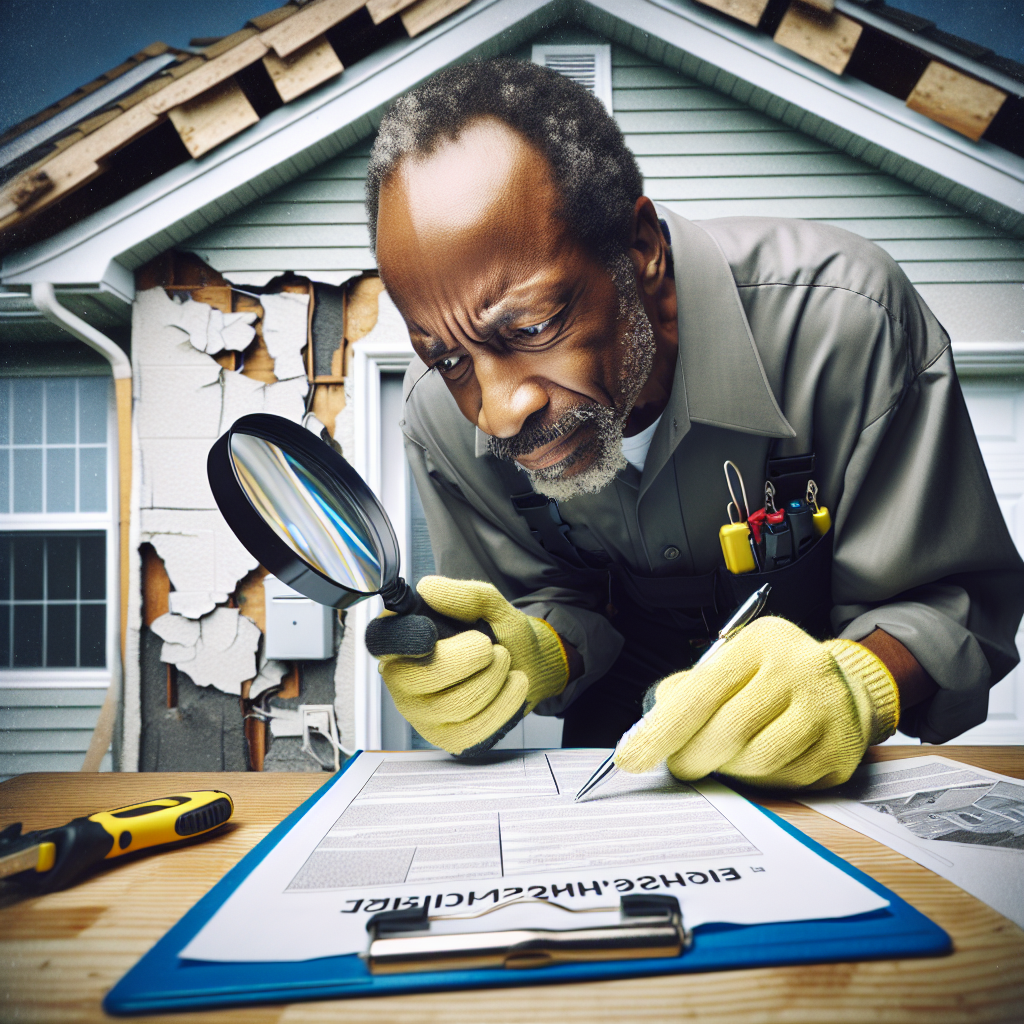Buying a home can be one of the most exciting yet overwhelming experiences of your life. I remember stepping into my first potential home, feeling the thrill mixed with a sprinkle of anxiety about what I might find. I’ve learned along the way that a solid home inspection is a crucial step if you want to make a wise purchase. Here’s what I’ve discovered about what to look for during a home inspection, broken down into key areas that really matter.
Structural Integrity
First things first, let’s talk about the foundation and structure of the home. You definitely don’t want to skip this part. The structural integrity of a home means everything—it’s basically the backbone of the place you might call home.
Foundation Issues
I can’t stress enough how important it is to check out the foundation carefully. Look for cracks in the walls, especially in the corners or around windows. A small crack might not mean a big deal, but if they’re wider than a quarter-inch, it’s time to raise an eyebrow.
Also, check for any unevenness in the floor. A sloping or bouncy floor could indicate foundation problems underneath. It’s wise to hear the inspector’s expert opinion on potential solutions or costs involved.
If you spot issues, don’t panic, but do prepare for possibly hefty repair costs. Sometimes a foundation repair could cost a pretty penny, and you don’t want any surprises after moving in.
Roof Condition
Next up is the roof. It’s the first line of defense against the elements, so it better be in good shape! Look for missing shingles, sagging areas, or water stains on ceilings that could indicate leaks.
I always ask my inspector to get up there and take a closer look—if that’s an option. They might find signs of wear and tear that aren’t observable from the ground. It’s better to know what condition it’s in before making an offer.
Don’t forget to inquire about the roof’s lifespan too. If it’s nearing its end, that’s another cost you’ll need to prepare for sooner rather than later.
Wall and Ceiling Inspection
As you’re inspecting the walls and ceilings, keep an eye out for any signs of water damage, such as stains or peeling paint. These could indicate previous leaks or mold, which can be a real nightmare for homeowners.
I always take the time to poke around a little, especially in corners where water tends to collect. A bit of mold can sometimes be easily remedied, but large infestations or hidden problems can lead to expensive remediation and repairs.
The inspector can help spot potentially problematic areas that I might overlook. Their trained eye for details can save the day and possibly your wallet!
Electrical Systems
Next on the list is the electrical system; it’s critical for modern living, and you definitely want to ensure that everything is up to code before signing on the dotted line.
Wiring and Outlets
During my home inspections, I’ve learned that older homes, in particular, might have outdated wiring which could be a fire hazard. It’s worth checking if the home has aluminum wiring, which is often a red flag.
I usually flip the switches and test each outlet as part of my inspection checklist. If anything feels warm or doesn’t work, it’s a good indication that there may be bigger issues at play.
Don’t forget to check for GFCI outlets, especially in kitchens and bathrooms, as they’re crucial for safety. Always better to be safe than sorry!
Electrical Panel
Next, take a look at the electrical panel. Is it dated? Are there any unmistakable scorch marks? It’s crucial to ensure that it is adequately rated for the home’s electrical needs. An undersized panel can lead to power outages or even fires.
A quick chat with the inspector can help me gauge if an upgrade is necessary, which could be a hassle and an extra expense after I’ve already committed to buying the place.
I make sure to ask about the potential costs and processes involved in any recommended upgrades. It’s always good to have an idea of what I might tackle in the future.
Lighting
Lastly, don’t overlook the lighting fixtures! They might not be the most significant issue, but they can provide insight into how well the home has been maintained. Flickering lights or mismatched fixtures could signal an underlying electrical issue.
I always keep things casual during the inspection—take some notes, point things out, and ask questions. The inspector is there to help, so utilize their expertise!
Additionally, consider the number of outlets in each room. It’s nice to have sufficient outlets for all your devices home; running extension cords everywhere isn’t ideal!
Plumbing Systems
Next up, plumbing. We all know how essential water is, and trust me, you don’t want to deal with plumbing issues after moving into your dream home!
Visible Pipes
First things first, I always check visible pipes for any leaks or corrosion. My inspector often runs the water during the visit to ensure everything flows as it should. It’s a simple step that can help prevent future headaches.
I take a moment to listen for strange noises in the pipes while running the faucets. Sometimes you can identify problems, like water hammer or leaks, just by listening.

https://Credit411USA.com
Additionally, observing how quickly the water drains can give insights into pipe conditions. Slow drains can indicate blockages or damage, which might require immediate attention.
Water Heater
Next, the water heater is another essential component of a home’s plumbing system. I always check for age and condition; many can last up to about 10-15 years, but age doesn’t always equal performance!
Don’t forget to look for signs of leaks around the water heater. I’ve seen water stains that led to bigger problems down the line, so it pays to check early!
Also, ask about maintenance history. A little preventive work can go a long way, and knowing what has been done can help me assess potential future needs.
Fixtures and Toilets
Lastly, I always check all faucets and toilets during my inspection. Look for any leaks around fixtures, and make sure toilets flush correctly. A little test run can indicate if anything might need replacement soon.
A leaking toilet can lead to more severe issues, so I make it a point to check these items off my list. If a toilet is continually running, it can cost a fortune in water bills.
Ultimately, ensuring everything is in working order with the plumbing helps guarantee a hassle-free living experience in the years ahead!
HVAC Systems
Finally, let’s discuss an essential part of any home: the heating, ventilation, and air conditioning systems. This is especially crucial in areas with extreme temperatures.
Heating Systems
First up is the heating system. I always ask to see the furnace or boiler and check its age and service history. It’s essential to know when it was last inspected. Nobody wants to wake up in the winter to a freezing house!
While I’m at it, I look for signs of corrosion or rust—those are bad signs that might suggest issues down the road. It’s best to discuss maintenance specifics with the inspector.
A huge tip is to ask if the system is energy-efficient; it can save a chunk on utility bills. If it’s outdated, consider budgeting for replacements sooner rather than later!
Cooling Systems
During warmer months, a cooling system becomes vital. I always check for central air conditioning units or window units and pay attention to their efficiency levels.
If possible, run the AC during the inspection and ensure it cools the house adequately. If it’s struggling, that could mean additional expenses down the line!
Ask the seller about regular maintenance as well. An investment in routine cleanings can really pay off in terms of longevity and performance!
Air Quality
Last but not least, air quality is super important. I often ask about ventilation systems or air purifiers in the home, especially if I have allergies.
Checking for signs of mold or musty odors is crucial too. It’s crazy how small issues can lead to significant health problems, especially for sensitive folks.
This is definitely an area worth discussing with an inspector to ensure we’ve got clean air flowing through our future home!
Conclusion
So there you have it! My personal guide on what to look for during a home inspection, broken down into these major areas. Remember, it’s all about being prepared and making an informed decision.
A thorough inspection can save you thousands in repairs and give you peace of mind if you end up making that purchase. Happy house hunting!
FAQs
1. Why is a home inspection so important?
A home inspection helps identify potential issues with the property, saving you from unexpected expenses later. It provides peace of mind before making such a big investment.
2. How long does a home inspection usually take?
Typically, a home inspection lasts about 2-3 hours, depending on the size and condition of the home. It’s essential to allow time for a thorough evaluation.
3. Can I attend the home inspection?
Absolutely! In fact, it’s encouraged. Attending allows you to ask questions and gain valuable insights about the property directly from the inspector.
4. What common issues should I look for during an inspection?
Common issues include foundation problems, plumbing leaks, electrical system integrity, roof condition, and HVAC functioning. Paying close attention to these areas can unveil significant info.
5. What should I do if I find issues during the inspection?
If issues arise, you can negotiate repairs or price adjustments with the seller, or you may choose to walk away from the deal, depending on the severity of the problems.

https://Credit411USA.com

